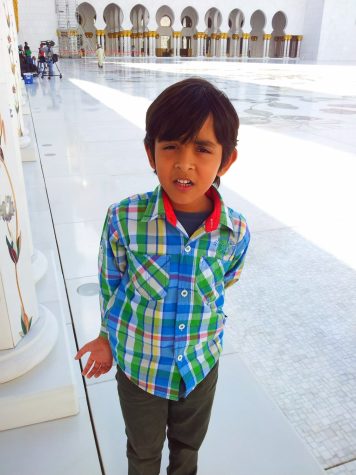Picture provided by Sami Hasnie
Sami Hasnie stands inside his house with his sister. Hasnie said he wants to “take advantage of [his] American education and go back [to the UAE].”
HUMANS OF BELLAIRE – Sami Hasnie, 10
“I’m for sure a minority—Muslim, Pakistani, an immigrant.
I don’t remember anything about Saudi Arabia, [where I was born]. I don’t remember anything. Then, I moved to Pakistan in kindergarten. Pakistan, I barely remember. I remember the masjid [a place of worship] and sometimes azan, a call to prayer. I remember in Pakistan, on days of Eid, there’d be goats and cows around the neighborhood. Even my family had two goats, and we’d slaughter them on Eid. I remember those things.

I lived in the city, but it seemed like my house was in the suburbs even in the city because it is a third world country, so it’s way less developed. My grandparents’ house is in the city, and even then you could see goats everywhere.
I left Pakistan two years later to go to the United Arab Emirates(UAE) because of my dad’s job. He’d just flip flop between UAE and Saudi Arabia, so I was caught up in one of the flops.
In the UAE, I used to live near a racetrack in an apartment building, and you could hear the F1 just racing around.
When we moved to the US, I’m pretty sure I felt indifferent. I was like, ‘Oh, we’re going to go live with our cousins.’ But when I got here, it took a little time to realize that I didn’t really like it here as much as I liked [the UAE]. It was a cultural change.
I spoke and wrote Urdu, but then I came to America and writing Urdu became hard. Also, another thing about being in America is food; there are a lot of foods I can’t eat because of halal [allowed under Islamic law]. In that way, I think it’s harder for me to integrate into the culture in America.
I want to take advantage of American education and go back. I’m going to get my degree here. If I want to be a doctor, I’m going to get my MD here, do my residency and then just leave, probably to the UAE.
It’s hard. I don’t think I have found anybody like me, Muslim and Pakistani, in America.”
![Sami Hasnie stands inside his house with his sister. Hasnie said he wants to "take advantage of [his] American education and go back [to the UAE]."](https://threepennypress.org/wp-content/uploads/2023/02/Picture_1-e1676224110241-675x900.jpg)